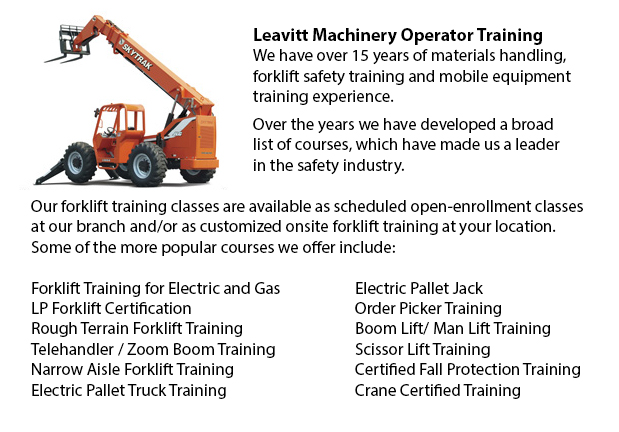
Oakville Telehandler Operator Training - Telehandler forklifts or Telescopic Handler forklifts are common industrial machines seen in various construction business environment. The telehandler is a helpful machinery and makes for a valuable device which could be used by many businesses. Telehandler Operator Training can be given on our premises or at your work location.
A telehandler forklift is a type of forklift designed with a telescoping arm for lifting pallets or other objects. These equipment are useful in construction projects for lifting items to upper floors. They are likewise essential in large warehouse environment for accessing shelves which are very high. The telescoping arm is frequently powered by hydraulics. Smaller, vertical forklifts can't reach the heights attainable by the telehandler forklift, which is what makes the telehandler really versatile. The telehandler forklift varies from different kinds of forklift in other ways; like for example, the telehandler types have pneumatic tires instead of solid rubber tires. Telehandler forklifts are similar in some respects to cranes, except that the telehandler cannot move its boom in multiple directions.
The forklift attachment enables the operator to unload pallets of things from a truck or other surface, and transport them onto a high surface like for example a rooftop. The telescoping arm offers great versatility as opposed to a regular forklift. The telehandler usually could move forward and backward as well as down and up. The telehandler forklift can be outfitted with different attachments.
Because of stability factors if a load is held very far from the forklift, the telescoping features does have some inherent risks. Thus, many of the newer models will be equipped along with outriggers, that extend from the front part of the lift truck helping to stabilize the equipment. Several models come along with sensors which would shut down the power to the telescoping boom if the vehicle becomes unstable. It is important for telehandler forklift operators to know how to gauge whether load weight can be safely lifted to a given height. Manufacturer charts are used for this reason. The size of the forklift determines the weight of the loads it could haul and the height at which it can operate. To be able to avoid personal injury and equipment damage, operators have to be trained correctly in accident prevention.
-
Oakville Overhead Crane Safety Training
Oakville Overhead Crane Safety Training - Overhead crane safety training equips operators with skills and knowledge regarding crane safety measures, accident avoidance, materials handling, and machinery and stock protection. Trainees will learn the t... More -
Oakville Crane Training Schools
Oakville Crane Training Schools - Our various Mobile Crane Operation programs are designed for skilled operators who needs re-certification or certification, and for inexperienced individuals who are seeking their very first job as an operator of a c... More -
Oakville Overhead Crane Certification
Oakville Overhead Crane Certification - The overhead crane certification course is a course that is designed to help trainees, even though they have language or literacy limits. The course consists of a classroom theory part and a practical hands-on... More -
Oakville Forklift Training Programs
Oakville Forklift Training Programs - If you are searching for work as an operator of a forklift, our regulatory-compliant forklift training programs provide exceptional instruction in various types and styles of forklifts, classes on pre-shift inspe... More -
Oakville Fall Protection Ticket
Oakville Fall Protection Ticket - The number one cause of death in the construction business come from fall-related accidents. There is more possibility for fall accidents depending on the types of work being performed within your workplace. Thus, be... More -
Oakville Zoom Boom Training
Oakville Zoom Boom Training - Zoom Boom Training focuses on correctly training potential operators on variable reach forklifts. The training objectives consist of gaining the understanding of the machine's physics and to define the job of the operato... More -
Oakville Aerial Lift Ticket
Oakville Aerial Lift Ticket - A boom truck is often recognized by the cable and telephone company vans that have the elongated arm folded over their roofs. Commonly, a bucket-like apparatus sits at the extension of extendable arms. Often referred to... More -
Oakville Scissor Lift Training
Oakville Scissor Lift Training - Scissor lifts need to be operated competently to be able to protect the safety of the machinery and the safety of people in the workplace. Operators who are skilled are trained to drive the specific model of scissor l... More

Forklift Certification Oakville
TOLL FREE: 1-888-254-6157
Oakville, Ontario
forkliftcertificationoakville.com
Email Us
About Us


